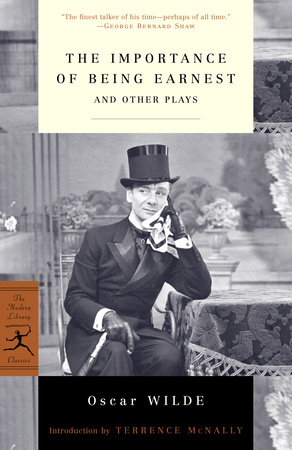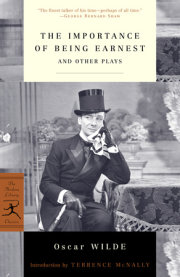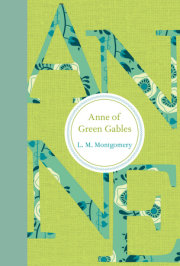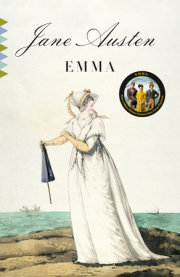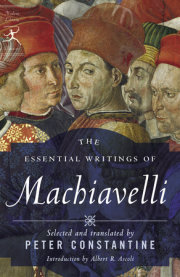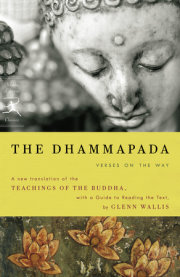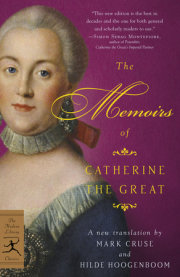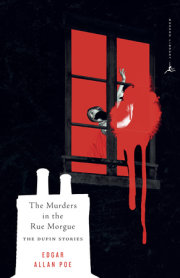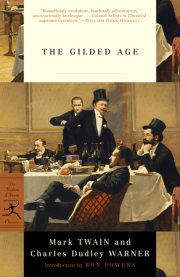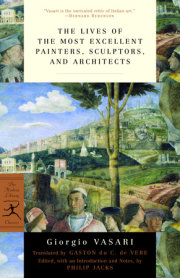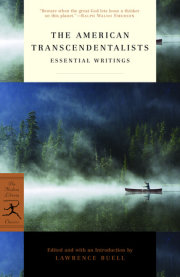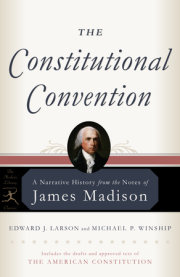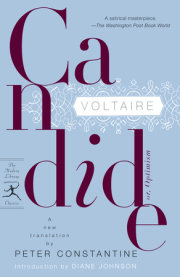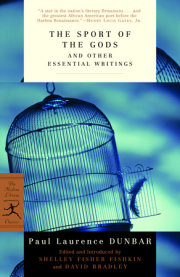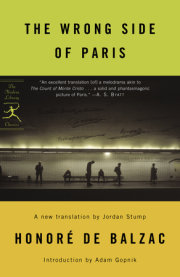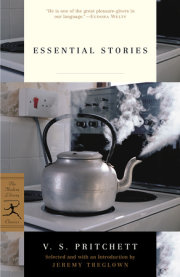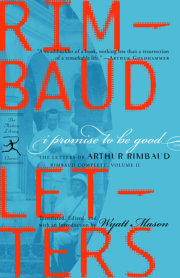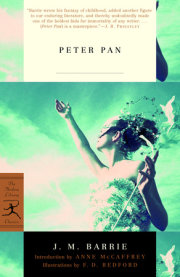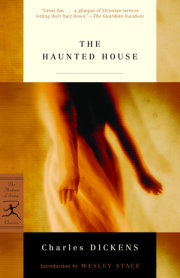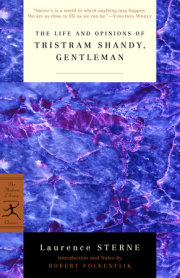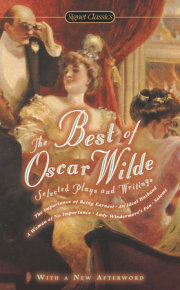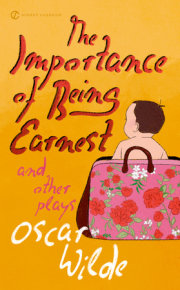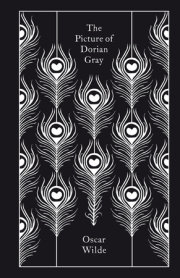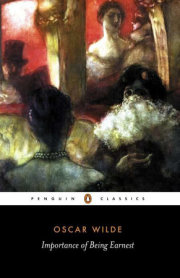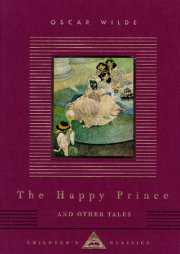First Act
Scene—Morning-room of Lord Windermere’s house in Carlton House Terrace.Doors C. and R. Bureau with books and papers R. Sofa with small tea-table L. Window opening on to terrace L. Table R. (Lady Windermere is at table R., arranging roses in a blue bowl.) (Enter Parker.
Parker. Is your ladyship at home this afternoon?
Lady Windermere. Yes—who has called?
Parker. Lord Darlington, my lady.
Lady Windermere. (Hesitates for a moment.) Show him up—and I’m at home to any one who calls. Parker. Yes, my lady. (Exit C.
Lady Windermere. It’s best for me to see him before to-night. I’m glad he’s come. (Enter Parker C.
Parker. Lord Darlington. (Enter Lord Darlington C. (Exit Parker.
Lord Darlington. How do you do, Lady Windermere?
Lady Windermere. How do you do, Lord Darlington? No, I can’t shake hands with you. My hands are all wet with these roses. Aren’t they lovely? They came up from Selby this morning.
Lord Darlington. They are quite perfect. (Sees a fan lying on the table.) And what a wonderful fan! May I look at it?
Lady Windermere. Do. Pretty, isn’t it! It’s got my name on it, and everything. I have only just seen it myself. It’s my husband’s birthday present to me. You know to-day is my birthday?
Lord Darlington. No? Is it really?
Lady Windermere. Yes, I’m of age to-day. Quite an important day in my life, isn’t it? That is why I am giving this party to-night. Do sit down. (Still arranging flowers.)
Lord Darlington. (Sitting down.) I wish I had known it was your birthday, Lady Windermere. I would have covered the whole street in front of your house with flowers for you to walk on. They are made for you. (A short pause.)
Lady Windermere. Lord Darlington, you annoyed me last night at the Foreign Office. I am afraid you are going to annoy me again.
Lord Darlington. I, Lady Windermere? (Enter Parker and Footman C., with tray and tea things.
Lady Windermere. Put it there, Parker. That will do. (Wipes her hands with her pocket-handkerchief, goes to tea-table L., and sits down.) Won’t you come over, Lord Darlington? (Exit Parker C.
Lord Darlington. (Takes chair and goes across L.C.) I am quite miserable, Lady Windermere. You must tell me what I did. (Sits down at table L.)
Lady Windermere. Well, you kept paying me elaborate compliments the whole evening.
Lord Darlington. (Smiling.) Ah, now-a-days we are all of us so hard up, that the only pleasant things to pay are compliments. They’re the only things we can pay.
Lady Windermere. (Shaking her head.) No, I am talking very seriously. You mustn’t laugh, I am quite serious. I don’t like compliments, and I don’t see why a man should think he is pleasing a woman enormously when he says to her a whole heap of things that he doesn’t mean.
Lord Darlington. Ah, but I did mean them. (Takes tea which she offers him.)
Lady Windermere. (Gravely.) I hope not. I should be sorry to have to quarrel with you, Lord Darlington. I like you very much, you know that. But I shouldn’t like you at all if I thought you were what most other men are. Believe me, you are better than most other men, and I sometimes think you pretend to be worse.
Lord Darlington. We all have our little vanities, Lady Windermere.
Lady Windermere. Why do you make that your special one? (Still seated at table L.)
Lord Darlington. (Still seated L.C.) Oh, now-a-days so many conceited people go about Society6 pretending to be good, that I think it shows rather a sweet and modest disposition to pretend to be bad. Besides, there is this to be said. If you pretend to be good, the world takes you very seriously. If you pretend to be bad, it doesn’t. Such is the astounding stupidity of optimism.
Lady Windermere. Don’t you want the world to take you seriously then, Lord Darlington?
Lord Darlington. No, not the world. Who are the people the world takes seriously? All the dull people one can think of, from the Bishops down to the bores. I should like you to take me very seriously, Lady Windermere, you more than any one else in life.
Lady Windermere. Why—why me?
Lord Darlington. (After a slight hesitation.) Because I think we might be great friends. Let us be great friends. You may want a friend some day.
Lady Windermere. Why do you say that?
Lord Darlington. Oh!—we all want friends at times.
Lady Windermere. I think we’re very good friends already, Lord Darlington. We can always remain so as long as you don’t——
Lord Darlington. Don’t what?
Lady Windermere. Don’t spoil it by saying extravagant silly things to me. You think I am a Puritan, I suppose? Well, I have something of the Puritan in me. I was brought up like that. I am glad of it. My mother died when I was a mere child. I lived always with Lady Julia, my father’s elder sister you know. She was stern to me, but she taught me, what the world is forgetting, the difference that there is between what is right and what is wrong. She allowed of no compromise. I allow of none.
Lord Darlington. My dear Lady Windermere!
Lady Windermere. (Leaning back on the sofa.) You look on me as being behind the age.—Well, I am! I should be sorry to be on the same level as an age like this.
Lord Darlington. You think the age very bad?
Lady Windermere. Yes. Now-a-days people seem to look on life as a speculation.8 It is not a speculation. It is a sacrament. Its ideal is Love. Its purification is sacrifice.
Lord Darlington. (Smiling.) Oh, anything is better than being sacrificed!
Lady Windermere. (Leaning forward.) Don’t say that.
Lord Darlington. I do say it. I feel it—I know it. (Enter Parker C.
Parker. The men want to know if they are to put the carpets on the terrace for to-night, my lady?
Lady Windermere. You don’t think it will rain, Lord Darlington, do you?
Lord Darlington. I won’t hear of its raining on your birthday!
Lady Windermere. Tell them to do it at once, Parker. (Exit Parker C.
Lord Darlington. (Still seated.) Do you think then—of course I am only putting an imaginary instance—do you think that in the case of a young married couple, say about two years married, if the husband suddenly becomes the intimate friend of a woman of—well, more than doubtful character, is always calling upon her, lunching with her, and probably paying her bills—do you think that the wife should not console herself?
Lady Windermere. (Frowning.) Console herself?
Lord Darlington. Yes, I think she should—I think she has the right.
Lady Windermere. Because the husband is vile—should the wife be vile also?
Lord Darlington. Vileness is a terrible word, Lady Windermere.
Lady Windermere. It is a terrible thing, Lord Darlington.
Lord Darlington. Do you know I am afraid that good people do a great deal of harm in this world. Certainly the greatest harm they do is that they make badness of such extraordinary importance. It is absurd to divide people into good and bad. People are either charming or tedious. I take the side of the charming, and you, Lady Windermere, can’t help belonging to them.
Lady Windermere. Now, Lord Darlington. (Rising and crossing R., front of him.) Don’t stir, I am merely going to finish my flowers. (Goes to table R.C.)
Lord Darlington. (Rising and moving chair.) And I must say I think you are very hard on modern life, Lady Windermere. Of course there is much against it, I admit. Most women, for instance, now-a-days, are rather mercenary.
Lady Windermere. Don’t talk about such people.
Lord Darlington. Well then, setting mercenary people aside, who, of course, are dreadful, do you think seriously that women who have committed what the world calls a fault should never be forgiven?
Lady Windermere. (Standing at table.) I think they should never be forgiven.
Lord Darlington. And men? Do you think that there should be the same laws for men as there are for women?
Lady Windermere. Certainly!
Lord Darlington. I think life too complex a thing to be settled by these hard and fast rules.
Lady Windermere. If we had “these hard and fast rules,” we should find life much more simple.
Lord Darlington. You allow of no exceptions?
Lady Windermere. None!
Lord Darlington. Ah, what a fascinating Puritan you are, Lady Windermere!
Lady Windermere. The adjective was unnecessary, Lord Darlington.
Lord Darlington. I couldn’t help it. I can resist everything except temptation.
Lady Windermere. You have the modern affectation of weakness.
Lord Darlington. (Looking at her.) It’s only an affectation, Lady Windermere. (Enter Parker C.
Parker. The Duchess of Berwick and Lady Agatha Carlisle. (Enter the Duchess of Berwick and Lady Agatha Carlisle C. (Exit Parker C.
Duchess of Berwick. (Coming down C., and shaking hands.) Dear Margaret, I am so pleased to see you. You remember Agatha, don’t you? (Crossing L.C.) How do you do, Lord Darlington? I won’t let you know my daughter, you are far too wicked.
Lord Darlington. Don’t say that, Duchess. As a wicked man I am a complete failure. Why, there are lots of people who say I have never really done anything wrong in the whole course of my life. Of course they only say it behind my back.
Duchess of Berwick. Isn’t he dreadful? Agatha, this is Lord Darlington. Mind you don’t believe a word he says. (Lord Darlington crosses R.C.) No, no tea, thank you, dear. (Crosses and sits on sofa.) We have just had tea at Lady Markby’s. Such bad tea, too. It was quite undrinkable. I wasn’t at all surprised. Her own son-in-law supplies it. Agatha is looking forward so much to your ball to-night, dear Margaret.
Lady Windermere. (Seated L.C.) Oh, you mustn’t think it is going to be a ball, Duchess. It is only a dance in honour of my birthday. A small and early.
Lord Darlington. (Standing L.C.) Very small, very early, and very select, Duchess.
Duchess of Berwick. (On sofa L.) Of course it’s going to be select. But we know that, dear Margaret, about your house. It is really one of the few houses in London where I can take Agatha, and where I feel perfectly secure about dear Berwick. I don’t know what society is coming to. The most dreadful people seem to go everywhere. They certainly come to my parties—the men get quite furious if one doesn’t ask them. Really, some one should make a stand against it.
Lady Windermere. I will, Duchess. I will have no one in my house about whom there is any scandal.
Copyright © 2003 by Oscar Wilde. All rights reserved. No part of this excerpt may be reproduced or reprinted without permission in writing from the publisher.

